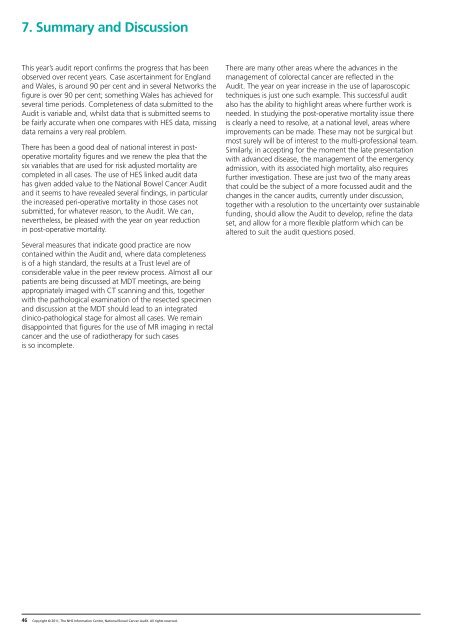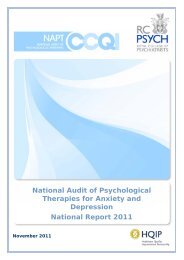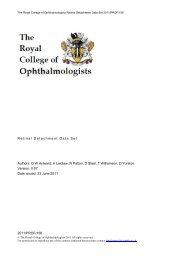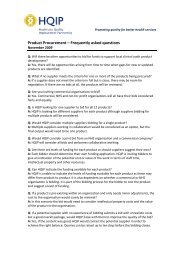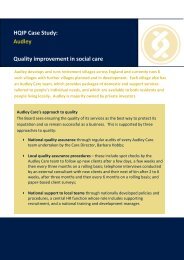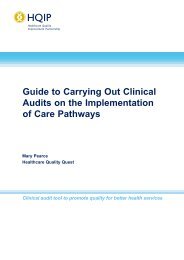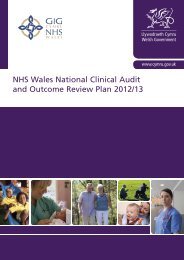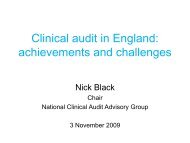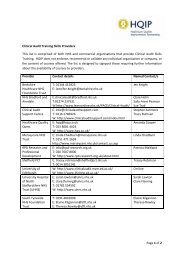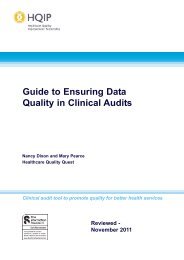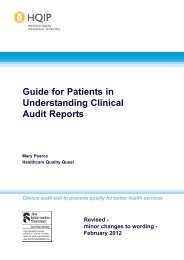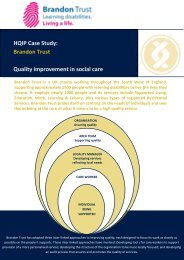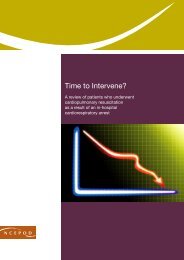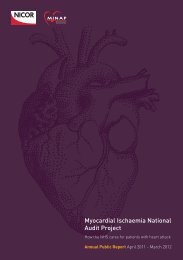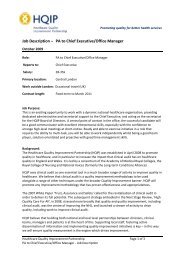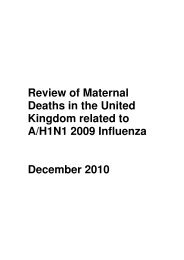National Bowel Cancer Audit Report 2011 - HQIP
National Bowel Cancer Audit Report 2011 - HQIP
National Bowel Cancer Audit Report 2011 - HQIP
Create successful ePaper yourself
Turn your PDF publications into a flip-book with our unique Google optimized e-Paper software.
7. Summary and Discussion<br />
This year’s audit report confirms the progress that has been<br />
observed over recent years. Case ascertainment for England<br />
and Wales, is around 90 per cent and in several Networks the<br />
figure is over 90 per cent; something Wales has achieved for<br />
several time periods. Completeness of data submitted to the<br />
<strong>Audit</strong> is variable and, whilst data that is submitted seems to<br />
be fairly accurate when one compares with HES data, missing<br />
data remains a very real problem.<br />
There has been a good deal of national interest in postoperative<br />
mortality figures and we renew the plea that the<br />
six variables that are used for risk adjusted mortality are<br />
completed in all cases. The use of HES linked audit data<br />
has given added value to the <strong>National</strong> <strong>Bowel</strong> <strong>Cancer</strong> <strong>Audit</strong><br />
and it seems to have revealed several findings, in particular<br />
the increased peri-operative mortality in those cases not<br />
submitted, for whatever reason, to the <strong>Audit</strong>. We can,<br />
nevertheless, be pleased with the year on year reduction<br />
in post-operative mortality.<br />
Several measures that indicate good practice are now<br />
contained within the <strong>Audit</strong> and, where data completeness<br />
is of a high standard, the results at a Trust level are of<br />
considerable value in the peer review process. Almost all our<br />
patients are being discussed at MDT meetings, are being<br />
appropriately imaged with CT scanning and this, together<br />
with the pathological examination of the resected specimen<br />
and discussion at the MDT should lead to an integrated<br />
clinico-pathological stage for almost all cases. We remain<br />
disappointed that figures for the use of MR imaging in rectal<br />
cancer and the use of radiotherapy for such cases<br />
is so incomplete.<br />
There are many other areas where the advances in the<br />
management of colorectal cancer are reflected in the<br />
<strong>Audit</strong>. The year on year increase in the use of laparoscopic<br />
techniques is just one such example. This successful audit<br />
also has the ability to highlight areas where further work is<br />
needed. In studying the post-operative mortality issue there<br />
is clearly a need to resolve, at a national level, areas where<br />
improvements can be made. These may not be surgical but<br />
most surely will be of interest to the multi-professional team.<br />
Similarly, in accepting for the moment the late presentation<br />
with advanced disease, the management of the emergency<br />
admission, with its associated high mortality, also requires<br />
further investigation. These are just two of the many areas<br />
that could be the subject of a more focussed audit and the<br />
changes in the cancer audits, currently under discussion,<br />
together with a resolution to the uncertainty over sustainable<br />
funding, should allow the <strong>Audit</strong> to develop, refine the data<br />
set, and allow for a more flexible platform which can be<br />
altered to suit the audit questions posed.<br />
46 Copyright © <strong>2011</strong>, The NHS Information Centre, <strong>National</strong> <strong>Bowel</strong> <strong>Cancer</strong> <strong>Audit</strong>. All rights reserved.


